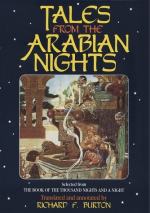Goethe ("Israel in der Wuste"), on the other hand, with curious ingenuity, turns every thing to the prejudice of the “headstrong man” Moses, save that he does grant him a vivid sentiment of justice. He makes him both by nature and education a grand, strong man, but brutal (roh) withal. His killing the Egyptian is a secret murder; “his dauntless fist gains him the favour of a Midianitish priest-prince . . . . under the pretence of a general festival, gold and silver dishes are swindled (by the Jews under Moses’s instigation) from their neighbours, and at the moment when the Egyptians believe the Israelites to be occupied in harmless feastings, a reversed Sicilian vesper is executed; the stranger murders the native, the guest the host; and, with a horrible cunning, only the first-born are destroyed to the end that, in a land where the first-born enjoyed such superior rights, the selfishness of the younger sons might come into play, and instant punishment be avoided by hasty flight. The artifice succeeds, the assassins are thrust out instead of being chastised.” (Quoted from pp. 99-100 “The Hebrews and the Red Sea,” by Alexander W. Thayer; Andover, Warren F. Draper, 1883.) With respect to the census of the Exodus, my friend Mr. Thayer, who has long and conscientiously studied the subject, kindly supplied me with the following notes and permitted their publication.
Trieste, October 11, 1887.
My Dear Sir Richard,
The points in the views presented by me in our conversation upon the Hebrews and their Exodus, of which you requested a written exposition, are, condensed, these:
Assuming that the Hebrew records, as we have them, are in the main true, i.e. historic, a careful search must reveal some one topic concerning which all the passages relating to it agree at least substantially. Such a topic is the genealogies, precisely that which Philippsohn the great Jewish Rabbi, Dr. Robinson, of the Palestine researches, and all the Jewish and Christian commentators—I know no exception—with one accord, reject! Look at these two columns, A. being the passages containing the genealogies, B. the passages on which the rejection of them is based:
A. 1. Genesis xxiv. 32 to xxv. 25 (Births of Jacob’s sons). 2. xxxv. 23-26 (Recapitulation of the above). 3. xlvi. 8-27 (List of Jacob and his sons, when they came into Egypt). 4. Ex. vi. 14-27 (Lineage of Aaron and Moses). 5. Numb. xxxvi. 1-2 (Lineage of Zelophehad). 6. Josh. vii. 17-18 (Lineage of Achan). 7. Ruth iv. 18-22 (ditto of David). 8. 1 Chron. ii. 9-15 (ditto). 9. Mat. i. 2-6 (ditto). 10. Luke iii. 32-37 (ditto). 11. Ezra vii. 1-5 (ditto of Ezra).
The lists of Princes, heads of tribes, the spies, the commission to divide conquered Palestine, contain names that can be traced back, and all coincide with the above.
B. 1. Gen. xv. 13. 2. Ex. xii. 40, 41. 3. Acts vii. 6.
These three give the 400 and the 430 years of the supposed bondage of the Bene Jacob, but are offset by Gen. xv. 16 (four generations) and Gal. iii. 17 (Paul’s understanding of the 430 years).




